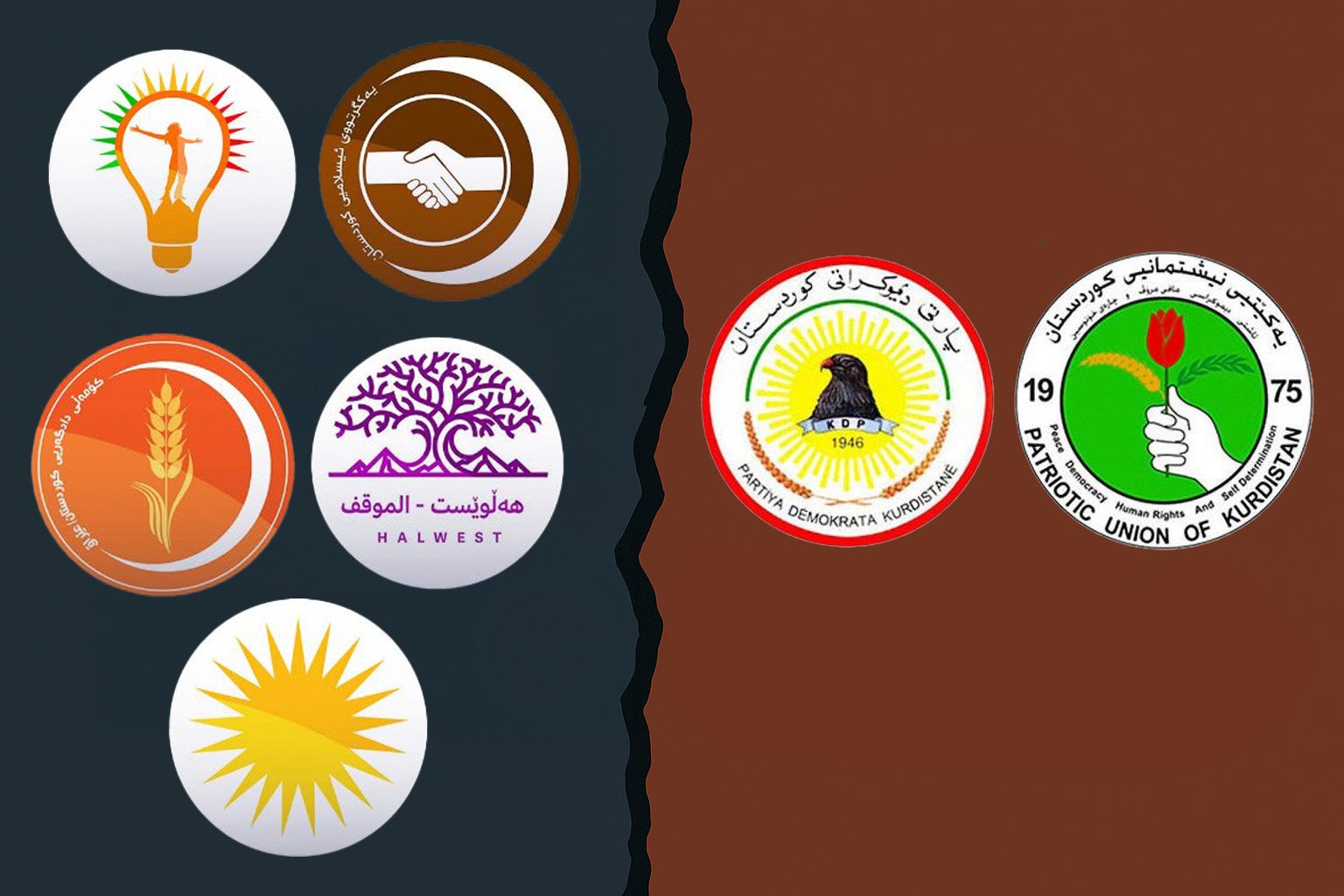PUK-KDP and Kurdish Opposition Coalition Talks Collapse Ahead of Iraqi Elections

Two separate attempts to form electoral coalitions for the upcoming Iraqi parliamentary elections have unraveled. The Kurdistan Democratic Party (KDP) and Patriotic Union of Kurdistan (PUK) failed to reach an agreement on the technical details of their proposed joint list for the disputed territories. Meanwhile, an opposition coalition effort collapsed after two of its five main components—the Halwest movement and Justice Group—withdrew from negotiations, dealing a serious blow to the formation of a unified opposition front.
Context: The Iraqi parliamentary elections are scheduled for November 11 this year, with the registration period for electoral lists and alliances already underway. The initial proposal for an opposition alliance was put forward by former Kurdistan parliament speaker Yousif Muhammad, as well as by the Justice Group and People’s Front. This initiative aimed to unite all opposition factions in the Kurdistan parliament, which collectively hold 31 out of 100 seats.
This move followed a call by PUK president Bafel Talabani to form a coalition with the KDP specifically for the disputed territories, designed to prevent the fragmentation of Kurdish votes in these contested areas. However, the PUK later clarified that they wanted all Kurdish groups to participate in the coalition, limited exclusively to the disputed territories. Despite these efforts, both initiatives have now collapsed due to technical disagreements and political rivalries.
Analysis: While a unified opposition front was always an ambitious goal, the most recent initiative represented the most serious attempt to date. However, deep divisions within the opposition camp made such unity unlikely. Of the five major opposition groups—New Generation, Halwest Movement, Islamic Union, Justice Group, and People’s Front—only the latter three appeared genuinely inclined to collaborate.
A key obstacle was the sharp rivalry between Halwest (which holds 4 seats) and New Generation (15 seats). Halwest is led by Ali Hama Saleh, a former member of the Gorran Movement who defected in 2020 after opposing the party’s continued participation in the KRG cabinet. He took with him a portion of Gorran’s voter base, much of which had already shifted to New Generation—putting the two factions in direct competition over the same constituency.
Tensions escalated following last October’s Kurdistan parliamentary elections, with public clashes between the two groups. Hama Saleh accused New Generation of being unprincipled and aligned with the KDP and Turkey—especially after its leader met with Turkey’s deputy foreign minister. In response, New Generation accused Hama Saleh of secretly collaborating with the PUK, particularly Deputy Prime Minister Qubad Talabani. These mutual accusations played a central role in the breakdown of talks.
One camp argues that the formation of the opposition alliance is being subtly encouraged by Turkey as part of a broader strategy to weaken the PUK—since such a coalition would primarily draw votes away from the PUK, not the KDP, which enjoys a more stable electoral base. Conversely, others accuse Halwest of acting in the PUK’s interest by withdrawing from the talks and thereby helping to fragment the opposition vote.
Estimates suggest that a unified opposition bloc could cost the PUK two to five parliamentary seats—an impactful number in Iraq’s competitive legislature.
Electoral Impact of Opposition Coalition vs Individual Contestation, Excluding Disputed Territories
Based on October 2024 Kurdistan Parliamentary Results (Hypothetical for Iraqi Elections)
Overall Impact Across All Constituencies
Scenario 1: Parties Contest Individually
Total Seats Projected (excluding quotas): 44
Scenario 2: Unified Opposition
Total Seats Projected (excluding quotas): 44
Sulaimani Constituency (Sulaimani & Halabja)
Total Seats: 18
Scenario 1: Parties Contest Individually
Scenario 2: Unified Opposition Coalition
Erbil Governorate
Total Seats: 15
Scenario 1: Parties Contest Individually
Scenario 2: Unified Opposition Coalition
Duhok Governorate
Total Seats: 11
Scenario 1: Parties Contest Individually
Scenario 2: Unified Opposition Coalition
Another sticking point was New Generation’s insistence on leading the opposition list and demanding a pre-election agreement to participate in the next Iraqi government. Halwest and the Justice Group viewed this as an opportunistic effort to leverage the alliance for senior posts in Baghdad.
Meanwhile, the PUK’s parallel effort to form a joint list with the KDP in the disputed territories has also faltered. Although PUK President Bafel Talabani reportedly discussed the idea with KDP Deputy President Masrour Barzani, the plan hinged on forming a broad Kurdish coalition limited to the disputed areas. However, some opposition factions—especially New Generation—categorically rejected participation in any alliance involving either the KDP or the PUK, derailing the proposal. Additionally, the PUK had little incentive to partner exclusively with the KDP, given that it holds a stronger voter base across most disputed areas, except Mosul. A bilateral alliance under such terms risked benefiting the KDP disproportionately.
This political fragmentation is not limited to the Kurdish scene. Arab and Turkmen parties are similarly divided in key contested areas such as Kirkuk and Mosul.
While negotiations among some smaller opposition factions continue, the prospect of a unified front has largely disappeared. Instead, a series of limited alliances may emerge—such as one between the Islamist parties, another linking Halwest with independent figures, or a bloc between New Generation and the Socialist Party. Meanwhile, the KDP and PUK are expected to run separate campaigns.









